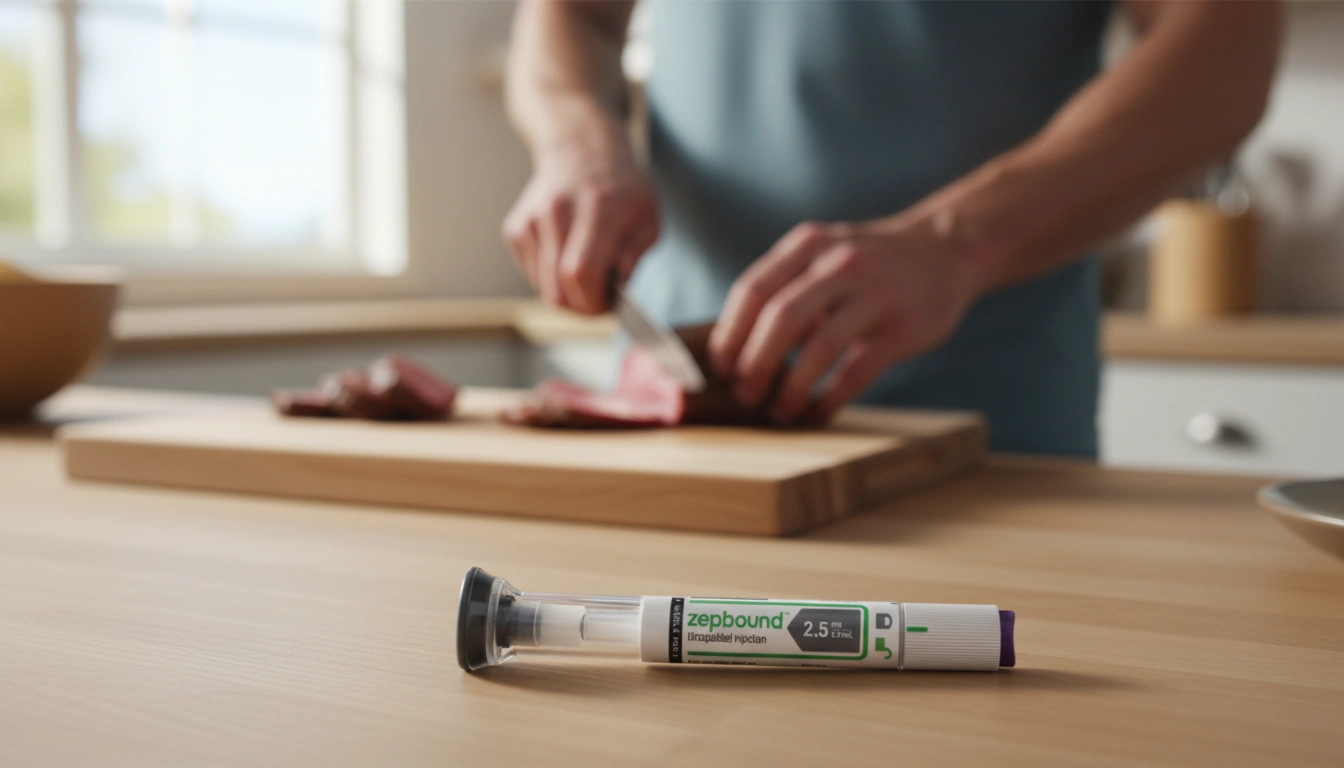Is 7.5 mg of Zepbound a Lot? Understanding the Dosage and Its Implications

Have you ever found yourself questioning the right dosage for a medication, particularly when it comes to weight loss solutions? The landscape of weight management is evolving, and medications like Zepbound (tirzepatide) are at the forefront. This innovative treatment, known for its effectiveness in weight management, prompts many to wonder—is 7.5 mg of Zepbound a lot?
Introduction
Weight management is a journey that many embark on, often filled with hurdles and challenges. According to recent studies, nearly 70% of American adults are classified as overweight or obese, making the need for effective solutions more pressing than ever. Zepbound, a glucose-dependent insulinotropic polypeptide (GIP) receptor and glucagon-like peptide-1 (GLP-1) receptor agonist, has emerged as a promising option for those struggling with obesity or weight management issues.
As a weight management tool, Zepbound is particularly intriguing because it is designed not only to assist with weight loss but also to support long-term weight maintenance. However, the question surrounding its dosages—specifically, whether 7.5 mg is considered a lot—demands a closer examination.
In this blog post, we will explore the recommended dosages of Zepbound, discuss how they impact weight loss effectiveness, and consider the implications of using different dosages. By the end of this article, you'll have a comprehensive understanding of Zepbound dosages and how they fit into your weight management journey.
Understanding Zepbound and Its Mechanism of Action
What is Zepbound?
Zepbound is a prescription medication developed to aid in weight management and treat obstructive sleep apnea in individuals with obesity. It works by mimicking the effects of natural hormones in the body that regulate appetite and glucose levels. This dual-action mechanism not only helps to suppress appetite but also improves insulin sensitivity, making it an effective tool for weight management.
How Does Zepbound Work?
Zepbound functions through its action on GIP and GLP-1 receptors. These hormones play a crucial role in regulating hunger and satiety. When Zepbound binds to these receptors, it slows gastric emptying and enhances feelings of fullness, allowing individuals to consume fewer calories without feeling deprived. This mechanism is essential for those looking to not only lose weight but also maintain their weight loss over time.
Zepbound Dosage Guidelines
Recommended Starting Dosage
The typical starting dosage for Zepbound is 2.5 mg administered once weekly. This low initial dose is crucial for allowing the body to adjust to the medication and minimizing potential gastrointestinal side effects, which are common with medications that affect appetite and digestion.
Dosage Escalation
After four weeks on the initial dose, patients typically increase their dosage to 5 mg once weekly. Further increases can occur in increments of 2.5 mg every four weeks, based on individual tolerance and response to the medication. The maximum recommended dosage of Zepbound is 15 mg per week.
Is 7.5 mg of Zepbound a Lot?
Now, addressing the central question: Is 7.5 mg of Zepbound a lot? This dosage is considered moderate within the context of the prescribed range. While it falls between the typical starting and higher maximum doses, many patients find that 7.5 mg can be effective without being excessive.
It's important to note that the effectiveness of Zepbound can vary by individual. Factors such as body composition, metabolic rate, and lifestyle will influence how someone responds to the medication at different dosages. Therefore, what might be a suitable dose for one individual could be different for another.
Exploring the Impact of Dosage on Weight Loss
Clinical Efficacy of Zepbound
Clinical trials have shown that Zepbound is effective for weight loss, with participants achieving significant reductions in body weight over time. For instance, in studies, patients using Zepbound at a higher dosage, such as 10 mg or 15 mg, saw greater weight loss compared to those on lower doses. However, the connection between dosage and weight loss isn't strictly linear.
Weight Loss Expectations with 7.5 mg
While higher doses may yield faster results, 7.5 mg can still be a powerful tool for many individuals. Research indicates that even at this moderate dosage, users can experience substantial weight loss, especially when combined with lifestyle changes such as a reduced-calorie diet and increased physical activity.
Safety and Side Effects
Common Side Effects
Like any medication, Zepbound comes with potential side effects. The most common include gastrointestinal symptoms such as nausea, diarrhea, and abdominal pain. These side effects can be more pronounced when starting treatment or after dose escalation.
Managing Side Effects
For many patients, increasing the dosage gradually can help minimize side effects. Starting at a lower dose and adjusting as tolerated is a strategy that aligns with our commitment to patient-centered care. At TrimRx, we emphasize the importance of medical supervision and personalized treatment plans to ensure safety and effectiveness.
The Importance of Personalized Treatment
Individualized Care at TrimRx
At TrimRx, we believe that every individual’s weight loss journey is unique. This is why we offer personalized weight loss programs that begin with a comprehensive assessment quiz. By taking our free quiz, you can determine your eligibility for prescription weight loss medications like Zepbound. This tailored approach ensures that your treatment plan aligns with your specific needs and health status.
Taking the quiz is a crucial first step in receiving personalized recommendations and support throughout your weight management journey. Take our free assessment quiz now!
Quick-Access Supplements to Support Your Journey
In addition to medications like Zepbound, we offer quick-access supplements such as GLP-1 Daily Support and Weight Loss Boost. These products are designed to complement your weight loss efforts, providing additional support for overall wellness. You can explore these options and make them a part of your journey:
Conclusion
As we’ve explored, understanding the dosage of Zepbound, including whether 7.5 mg is a lot, is essential for those considering this medication for weight management. This moderate dosage can be effective for many, but it's crucial to personalize treatment based on individual needs and responses.
At TrimRx, we are dedicated to providing safe, effective, and personalized weight loss solutions. By starting with our free assessment quiz, you can take the first step toward a tailored treatment plan that fits your unique journey.
FAQs
Is 7.5 mg considered a high Zepbound dose?
No, 7.5 mg of Zepbound is a mid-range dosage rather than a lot, according to understanding the dosage scale and its implications. TrimRx clarifies understanding the dosage hierarchy, explaining that 7.5 mg of Zepbound is not a lot compared to maximum 15 mg, with moderate implications.
What does 7.5 mg Zepbound dosage mean for side effects?
The 7.5 mg Zepbound dosage produces moderate side effects when understanding the dosage progression, with implications including manageable nausea for most patients. TrimRx prepares patients for understanding the dosage effects at 7.5 mg, noting that while not a lot, it has stronger implications than lower levels.
Is 7.5 mg of Zepbound a lot for weight loss results?
The 7.5 mg dosage provides substantial weight loss without being a lot, according to understanding the dosage effectiveness and implications for outcomes. TrimRx explains understanding the dosage impact at 7.5 mg, noting this Zepbound amount produces significant results despite not being a lot comparatively.
How does 7.5 mg Zepbound dosage compare to other amounts?
The 7.5 mg dosage sits in the middle range when understanding the dosage spectrum, with implications showing it is not a lot but more than starting levels. TrimRx compares understanding the dosage positioning, clarifying that 7.5 mg of Zepbound is not a lot relative to maximum but carries moderate implications.
Will 7.5 mg of Zepbound be a lot for me personally?
Whether 7.5 mg is a lot depends on individual tolerance when understanding the dosage response, with implications varying by sensitivity and experience. TrimRx personalizes understanding the dosage meaning, determining if 7.5 mg of Zepbound feels like a lot based on your specific implications.
Is jumping to 7.5 mg Zepbound dosage too much?
Jumping to 7.5 mg directly is a lot and dangerous when understanding proper dosage escalation, with implications including severe side effects. TrimRx prevents understanding incorrect dosage progression, ensuring patients never skip to 7.5 mg Zepbound as this is definitely a lot too quickly with serious implications.
Does 7.5 mg Zepbound dosage require special monitoring?
The 7.5 mg dosage requires standard monitoring rather than a lot of extra oversight when understanding the dosage safety, with implications for routine care. TrimRx provides understanding of dosage supervision needs, noting that 7.5 mg of Zepbound is not a lot in terms of required monitoring implications.
Is staying at 7.5 mg Zepbound dosage long-term okay?
Staying at 7.5 mg long-term is fine if effective, as this dosage is not a lot when understanding maintenance requirements, with positive implications. TrimRx supports understanding prolonged dosage use at 7.5 mg, confirming this Zepbound amount is not a lot for extended therapy implications.
What are the implications if 7.5 mg Zepbound feels like a lot?
If 7.5 mg feels like a lot when understanding your dosage tolerance, implications include needing slower escalation or dose reduction for comfort. TrimRx addresses understanding when the dosage seems excessive, helping when 7.5 mg of Zepbound feels like a lot with concerning implications.
Should most people reach 7.5 mg Zepbound dosage?
Most people reach 7.5 mg during escalation when understanding standard dosage protocols, though this is not a lot with implications for typical progression. TrimRx guides understanding the dosage trajectory, noting that reaching 7.5 mg of Zepbound is not a lot to expect with normal implications.
Does this level cause more hair loss than lower doses?
Hair shedding correlates more with weight loss rate than specific dose levels. Any dose producing rapid weight reduction may trigger temporary hair loss regardless of strength.
Can I split this dose into twice weekly injections?
No, medication is formulated for once-weekly administration at prescribed doses. Splitting doses alters pharmacokinetics and has not been studied for safety or effectiveness.
Does this dose level affect cholesterol differently?
Metabolic improvements including cholesterol changes correlate with weight loss achieved rather than specific dose amounts. Higher doses may produce greater lipid improvements through enhanced weight reduction.
Will I plateau at this dose eventually?
Weight loss naturally slows over time at any stable dose as your body adjusts. Plateaus reflect metabolic adaptation rather than dose inadequacy in most cases.
Should I exercise differently at this dose level?
Exercise recommendations remain consistent across dose levels, focusing on sustainable activity supporting overall health. Dose does not dictate specific exercise modifications beyond general energy level considerations.

Transforming Lives, One Step at a Time
Keep reading
Navigating Your Path: How Many Doses Are In Zepbound and What It Means for Your Health Journey
Curious how many doses are in Zepbound? Discover its weekly dosing schedule, available strengths, and titration process for effective weight loss. Learn more!
Navigating Your Zepbound Journey: Understanding Dosing and Expert Guidance
Wondering how to split doses of Zepbound? Learn why it’s unsafe & not recommended. Get expert guidance on Zepbound dosing for safe, effective weight loss with TrimRx. Click to learn more!
Understanding Zepbound Dosing: What is the Lowest Dose Available for Your Weight Loss Journey?
Curious what is the lowest dose of Zepbound available? Learn about Zepbound’s 2.5mg starting dose, titration, and safe use for weight loss. Get expert guidance!



